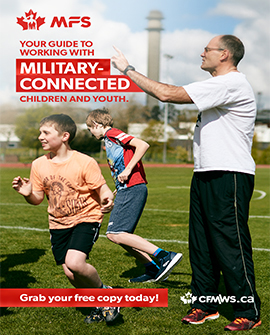 Whether you are contemplating separation from your spouse or partner or you have already separated, communication is always a key factor when going through a significant change as a couple. Many factors play a part in making separations both amicable and difficult.
Whether you are contemplating separation from your spouse or partner or you have already separated, communication is always a key factor when going through a significant change as a couple. Many factors play a part in making separations both amicable and difficult.
According to members of the Canadian Counselling and Psychotherapy Association, the two most common factors that lead to divorce within military families are:
- Mobility of military families due to relocation and stress associated with the moves;
- Risks related to a career in the Canadian Armed Forces.
“These two factors by themselves contribute to stress in family and relationships, which are an additional challenge faced by military families and couples. While the challenge is there, the knowledge of the risk factors can be helpful for military families who then hopefully take steps for developing a support system and, when necessary, reaching out to trained professionals who understand the challenges of military families,” explained John Driscoll, past president of the CCPA.
Although military families are not excluded from other reasons for divorce or separation, the two above factors are the most prevalent and add to the risk of divorce between military couples. While the process of divorce can lead to a variety of outcomes, the first thing to typically go is communication.
Driscoll and his colleagues Carrie Foster, Quebec Anglophone Director, CCPA, and Cynthia Schoppmann, Ontario Francophone Director, CCPA, offer five pieces of advice for couples who are thinking about ending their relationship or are already in the process

1 | Keep Your Eye On The Goal
Relationships are very complicated. When they break down, it can be even more complicated to communicate in a respectful way. In the midst of conflict, it is always helpful to try and take a step back, look at the big picture and the goals you want to achieve, and use that viewpoint to focus on the most important things for you and your new family.

2 | Believe In Yourself
No matter how tough things get, no matter how alone you may feel or how others may seem to say you have failed or are the problem, believe in yourself and know that you’re doing your best for your newly separated family and yourself.

3 | Give & Take
In most relationships, there is the normal give-and-take of daily living and the sacrifices we make for our partners and children. When there is a breakdown in a relationship, try to realize that for separated families to work together, there still needs to be that give-and-take and sacrifice, especially to support the children you love.

4 | Encourage Positive Relationships
When children are involved, one key point to remember is that the scars that an adult has regarding what transpired and led to the relationship ending will usually not be the same scars shared by the children. Children can understand there was conflict, but they typically want to maintain a positive relationship with both parents.
It is, at times, difficult to encourage that positive relationship with the other parent and the children involved, but it is usually appropriate and necessary. If the above steps have been tried and used, but your family is still struggling to communicate, CCPA suggests consulting a counsellor.
“The Canadian Armed Forces provides a broad spectrum of excellent support services. However, sometimes there can be a matter of eligibility for services, or the couple may wish to look outside the military for support with a problem they are addressing,” says Foster.
The Canadian Counselling and Psychotherapy Association has more than 7,100 members across Canada who are professionally trained to support families, couples, and even ex-couples with new challenges they are facing, including co-parenting after a separation.

“Separation and divorce are difficult for both partners. Emotions run high. There is often hurt, anger, and resentment. It is easy to forget that the children, too, are living this separation and adjusting to the new family configuration,” shared Schoppmann.
“Additionally, children are sponges and learn by our example, so even those private conversations risk being heard as they strain to hear to understand what is going on. It is important to explain in simple, non-blaming terms what is happening and allow them the space to ask questions and share their feelings.” The therapists suggest keeping conversations about the other partner neutral and caring without alarming the children or putting them in a position of go-between.
Couples seeking help or advice can visit the CCPA website and narrow down a certified counsellor and area of specialization. It is important to remember that by eliminating negative and hurtful communication, parents can help change the family dynamic for both the parents and the kids.

5 | Remember to Support the Children
Sometimes, an ex-partner appears not to want to try to work to support the children in the new family dynamic. If a partner is behaving poorly or not being respectful of the children, then it can be necessary to take a stronger approach. When making these decisions, it is good to consult outside professional support, as well as call on family and friend support to make the right decisions for you and your family.
“In some provinces, mediation services exist to help couples to navigate the uncomfortable discussion of ‘uncoupling.’ It is always important to remember that when there are children involved, you will be in a relationship with your ex-partner for a lifetime. The relationship is less intimate, but the lines of communication need to remain open and respectful,” noted Driscoll.










